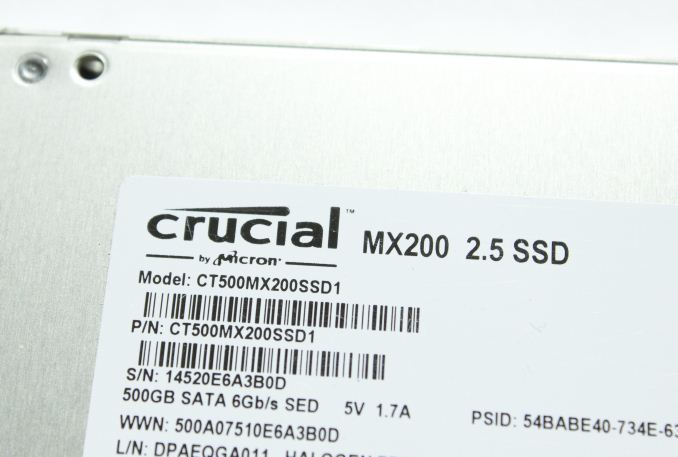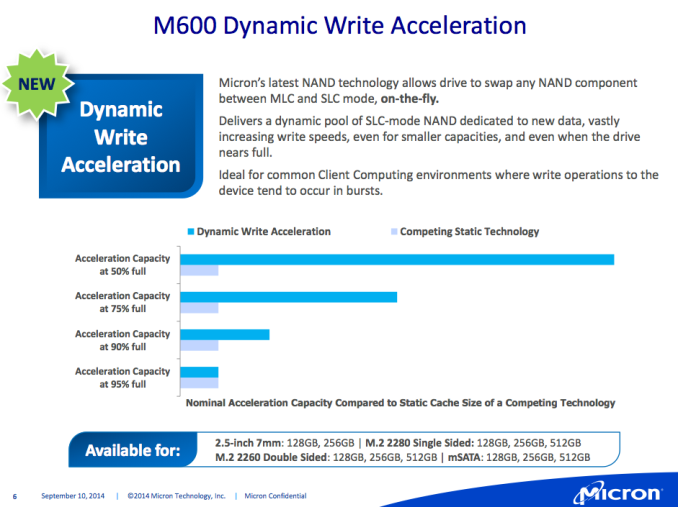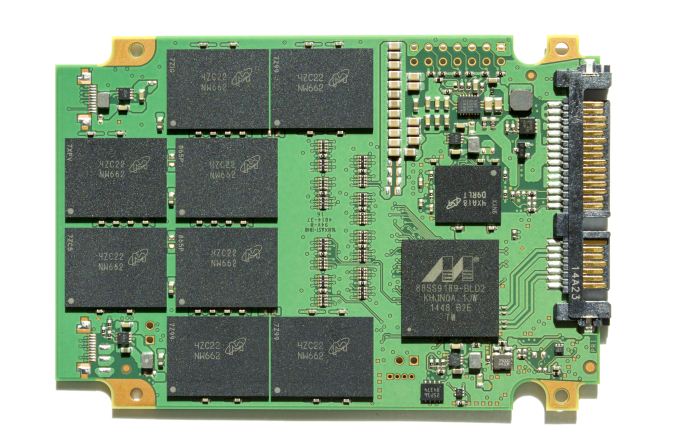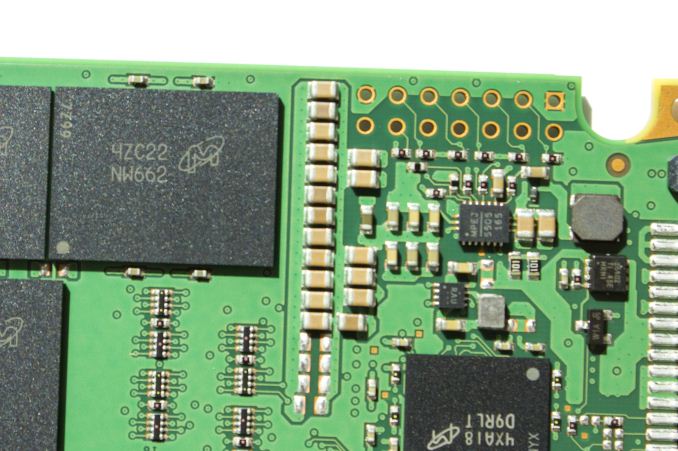Crucial MX200 (250GB, 500GB & 1TB) SSD Review
by Kristian Vättö on May 22, 2015 8:00 AM EST- Posted in
- Storage
- SSDs
- Crucial
- MX200
- Micron 16nm

Last year Micron launched M600 SSD for the OEM market, but unlike in the past there was no simultaneous retail product release. We were told that the M600 firmware features would sooner than later find their way into a Crucial branded product, which finally materialized back at CES when Crucial unveiled the MX200.
The hardware has remained unchanged from the MX100 as the MX200 sports the same Marvell 88SS9189 controller with Crucial-Micron's custom firmware and Micron's 16nm MLC NAND, but the biggest change compared to the MX100 is the addition of Dynamic Write Acceleration (DWA), which is the company's SLC cache implementation. I covered DWA in detail in our Micron M600 review, so I suggest you give it a read if you are interested in a more thorough explanation, but in short the size of the cache is dynamic and varies depending on the amount of data in the drive. Basically, all empty NAND runs in SLC mode, so the size of the cache shrinks as data is written to the drive. I wasn't very satisfied with DWA in the M600 review because it didn't seem to yield any noticeable performance gains, so I hope the engineers have tweaked the caching algorithms for the MX200.
The MX200 is positioned above the BX100 we recently reviewed and liked very much. The CES announcement signaled a change in product strategy because previously Crucial has more or less had just one main product line, but with BX100 and MX200 Crucial is trying to cater a larger segment of the market by offering the BX100 for the mainstream public and the MX200 for the more demanding enthusiast/professional user group.
| Crucial MX200 Specifications | ||||
| Capacity | 250GB | 500GB | 1TB | |
| Form Factors | 2.5" 7mm, mSATA, M.2 2260 & 2280 | 2.5" 7mm | ||
| Controller | Marvell 88SS9189 | |||
| NAND | Micron 16nm 128Gbit MLC | |||
| DRAM (DDR3-1600) | 512MB | 512MB | 1GB | |
| Sequential Read | 555MB/s | 555MB/s | 555MB/s | |
| Sequential Write | 500MB/s | 500MB/s | 500MB/s | |
| 4KB Random Read | 100K IOPS | 100K IOPS | 100K IOPS | |
| 4KB Random Write | 87K IOPS | 87K IOPS | 87K IOPS | |
| Dynamic Write Acceleration | Yes | Yes (mSATA and M.2 models only) | No | |
| DevSleep Power | 2mW | 2mW | 2mW | |
| Slumber Power | 100mW | 100mW | 100mW | |
| Max Power | 4.4W | 4.7W | 5.2W | |
| Encryption | TCG Opal 2.0 & IEEE-1667 (eDrive) | |||
| Endurance | 80TB | 160TB | 320TB | |
| Warranty | Three years | |||
| Crucial MX200 | $110 | $200 | $427 | |
The MX200 is available in a variety of form factors, which includes rarer double-sided M.2 2260 and single-sided M.2 2280 on top of the normal 2.5" and mSATA models. Due to PCB space restrictions in mSATA and M.2 form factors, only the 2.5" lineup carries a 1TB SKU and the mSATA and M.2 models top out at 500GB. The 2.5" SKUs also include an Acronis True Image HD license and 7mm to 9.5mm spacer to ensure laptop compatibility, whereas the mSATA and M.2 retail packages have only mounting screws in addition to the drive itself. All MX200 models are compatible with Crucial's Storage Executive software, which we covered thoroughly in the BX100 review.
| 250GB | 500GB | 1TB | |
| Raw NAND Capacity | 256GiB | 512GiB | 1024GiB |
| # of NAND Packages | 8 | 8 | 16 |
| # of Die per Package | 2 | 4 | 4 |
| Over-Provisioning | 9.1% | 9.1% | 9.1% |
The MX200 includes a bit more over-provisioning than its predecessor as Crucial has decided to switch from power of two capacities to even tens/hundreds. A part of the over-provisioning is dedicated to Micron's NAND-level parity scheme called RAIN, but the rest is used as additional provisioning to increase stead-state performance as well as overall endurance.
Endurance wise the MX200 is one of the top drives on the market. Whether the extra endurance is needed is another question, though, because the 320TB rating in the 1TB model would translate to 175GB of writes per day for five years, which is far more than what most power users write to a drive on a daily basis, let alone a typical client user. Since Dynamic Write Acceleration is only enabled on the 250GB model (although 500GB mSATA and M.2 models have DWA enabled), the high endurance comes purely from Crucial's longer validation, although obviously Crucial has access to the best NAND dies given that its parent company Micron manufactures the NAND. Oddly enough the warranty is only three years as it would make sense offer longer warranty with such a high endurance rating and nearly all high-end SSDs today offer either five or ten year warranties.
Aside from higher endurance and supposedly better performance, the key differentiator to BX100 is the support for hardware-accelerated encryption in the form of TCG Opal 2.0 and IEEE-1667 standards that together enable the use of Microsoft eDrive. Crucial was an early supporter of the standards and first implemented them into the M500 two years ago, so they have now become a part of the common Crucial feature set, although the BX100 dropped the support for higher cost efficiency. It seems that Crucial has taken a strategy to guide the corporations that require hardware encryption towards the more expensive MX200, which is what many SSD companies have been executing in the form of a separate "business SSD" lineup.
The ceramic capacitor array in the 1TB MX200
In the M600 review, I explained how Crucial's power loss protection in client SSDs is not the same as in enterprise drives, but a backup circuitry that merely protects the existing data from corruption. The MX200 brings no changes to that and only offers data-at-rest protection, meaning that the NAND mapping table as well as any in-flight user data are still vulnerable to sudden power losses.
| AnandTech 2015 SSD Test System | |
| CPU | Intel Core i7-4770K running at 3.5GHz (Turbo & EIST enabled, C-states disabled) |
| Motherboard | ASUS Z97 Deluxe (BIOS 2205) |
| Chipset | Intel Z97 |
| Chipset Drivers | Intel 10.0.24+ Intel RST 13.2.4.1000 |
| Memory | Corsair Vengeance DDR3-1866 2x8GB (9-10-9-27 2T) |
| Graphics | Intel HD Graphics 4600 |
| Graphics Drivers | 15.33.8.64.3345 |
| Desktop Resolution | 1920 x 1080 |
| OS | Windows 8.1 x64 |
- Thanks to Intel for the Core i7-4770K CPU
- Thanks to ASUS for the Z97 Deluxe motherboard
- Thanks to Corsair for the Vengeance 16GB DDR3-1866 DRAM kit, RM750 power supply, Hydro H60 CPU cooler and Carbide 330R case













62 Comments
View All Comments
jonovw - Saturday, May 23, 2015 - link
When I got mine, the MX200 was pretty reasonably priced compared to it's competition for a M.2 SATA drive.MrMilli - Saturday, May 23, 2015 - link
"Another thing I'm not very satisfied with is the Dynamic Write Acceleration. I don't think an SLC cache is very useful in an MLC based drive because the performance benefits are marginal, at least with SATA 6Gbps."Sandisk showed with the Ultra II that SLC caching doesn't have to mean terrible latency if implemented correctly.
As a cheap drive, the ARC 100 is looking better every day. For typical desktop workloads, it 'feels' the fastest thanks to it's low latency. I don't understand why it's not recommended more often.
MrSpadge - Saturday, May 23, 2015 - link
I looks like Crucial should really tune their algorithm. Very short bursty writes, which still fit into the DRAM cache, can easily be written in MLC mode. There's enough time for time. Longer bursts could / should be written as SLC, if enough drive space is available. Otherwise MLC mode would be better, if it's likely the data would have to be reorganized soon anyway. Which also happens under long sustained writes, where there's a point where the drive should switch from SLC to MLC mode.Johnny Five - Saturday, May 23, 2015 - link
Well, going back to when SSD's were becoming all the rage and OCZ was having all their problems with their controllers, etc.... Crucial was one of the most consistently reliable and dependable SSD's in the market....... I have consistently used my 4 m4 series 128 GB SSD's for nearly 5 years without not 1 single problem, and have used (2) m550's or several years with no problems........reliability is what makes me keep returning to a certain vendor,, be it motherboard, memory, videocard, HDD, etc....so far my MX200 250 GB SSD is working just as great as my old C300 or m4's are doing.... lets hope that this MX200 lasts at least 3 to 4 years with no problems.... something I can not say for SSD's made by OCZ, Intel, Samsung, or HD's like Western digital, Seagate, Toshiba, Maxtor.......... ( am hoping that Western Digital HD's get better now that they bought out Hitachi........ I have over 18 hitachi Hard Drives ranging from 14 yrs old to 2 yrs old, and have yet to have one brick on me, like most every other brand has...... )
regarding TRIM and SSD degrading performance.......... after 5 years +/- continuous use of my Crucial m4 series SSD's ...... running test via AIDA64 Extreme Edition software, I am still running around 98.7 + % performance level, hopefully this MX200 will run just as good....
Impulses - Wednesday, May 27, 2015 - link
Crucial's had it's rash of firmware issues like anybody else...fokka - Saturday, May 23, 2015 - link
i didn't expect the bx100 to stay that competitive, i guess it's the drive to get right now, especially in a mobile setup where power draw matters.Harry Lloyd - Saturday, May 23, 2015 - link
I want a 512 GB drive with MX100/200 performance for about 100 $. Possible next year (3D NAND or something)?Ramon Zarat - Saturday, May 23, 2015 - link
I'm glad my 2 X Crucial M4 128GB in RAID0 are *STILL* king in 99.999% of my desktop scenarios. over 3 1/2 years now, and not as single issue. Still pumping ~900MB/s in sequential read, even at 75% full! Diskinfo reports them at 97% good. At this rate, they will last me well over 50 years before reaching 50% degradation!hrrmph - Saturday, May 23, 2015 - link
It's good to see AT posting critical reviews (where deserved) again.It's also good to see innovative thinking again, such as the call for the industry to benchmark SSDs at lower queue depths. I would like to read more on the low queue depth issues and which client machines / users are able to push above 1 or 2 QD (if any) and under what circumstances.
philipma1957 - Sunday, May 24, 2015 - link
It would be nice if either crucial or samsung would make larger ssd's in a 2.5 inch form factor.a 1.5tb or 2tb ssd gives me an all ssd system while a 1tb ssd gives me the need for a second drive.
Instead of the little tweaks here and there. Like this one (MX200) which seems to me a fail gives us the size increase. How many years since the first 1tb ssd from crucial (listed 960gb)